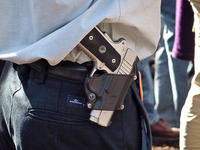-
Estonia considers draft for newly created cyber army in emergency
Estonia just announced the creation of an all-volunteer cyber army; the Cyber Defense League unites computer experts from the private sector and the government; the League conducts regular drills and operates under a unified military command; Estonian defense officials are contemplating instituting a cyber expert draft in the event of a serious national crisis; Estonia is the first country to experience a cyber war — in 2007 Russian hackers, suspected of having been directed by the Russian military, systematically shut down major government, financial, political and news Web sites
-
-
Lawmakers looking to cash-strapped local police for extra security

For members of Congress worried about their safety in the wake of the Arizona mass shooting, relying on local law enforcement may not be an option as cutbacks hit cash-strapped police forces; Rep. Jesse Jackson Jr. (D-Illinois) this week proposed additional congressional spending for security at district offices; Rep. Peter King (R-New York) proposed barring people from bringing a weapon within 1,000 feet of a government official; Rep. Louie Gohmert (R-Texas) suggested allowing lawmakers to carry weapons inside the Capitol; already, Reps. Jason Chaffetz (R-Utah) and Heath Shuler (D-North Carolina) announced they are going to step up the frequency with which they carry concealed weapons to district events
-
-
New report disputes Gitmo repeat offender rates
New report disputes U.S intelligence statistics on Gitmo recidivism rates; the director of national intelligence reports indicated that 13.5 percent of former detainees had returned to the battlefield, while the new study shows only 6 percent; new report cites each of the thirty-six confirmed and suspected terrorists by name; as of October 2010, 598 detainees have been released from Guantanamo
-
-
Materials for fertilizer bombs not regulated
Mixtures of ammonium nitrate and fuel oil (ANFO) are used in about 80 percent of all explosives used in North America each year, mostly in the mining and demolition industries; they were also used by Timothy McVeigh in Oklahoma City, and in insurgents’ IEDs in Iraq and Afghanistan; explosives-grade ammonium nitrate can be refined from commercial-grade fertilizers using processes readily found online; there are even YouTube videos that break down the process step by step; commercial grade fertilizers are not regulated; those states that address the issue typically require merchants to keep records of who buys what, but there are no limitations on who can buy what and no reporting requirements
-
-
Israel places troops on alert after Lebanon government falls
Lebanon plunged into crisis after Iran orders Hezbollah out of the government; Hezbollah’s move comes in anticipation of a UN tribunal’s decision to charge Hezbollah with masterminding and carrying out the 2005 assassination of Lebanon prime minister Rafik Hariri; by withdrawing its eleven cabinet ministers from the government, Hezbollah prevents the 30-member cabinet from acting on the UN tribunal’s determination (for that, the Lebanese constitution requires two-thirds cabinet majority); Iran is also acting to thwart a joint Saudi-Syrian effort to curb the growing power of Hezbollah — already the most militarily powerful group in the country; Israel’s military goes on alert
-
-
Move to strengthen Capitol security in wake of Arizona shooting

Representative Dan Burton (R-Indiana) intends to introduce legislation similar to a measure he presented in 2007 to enclose the House Chamber in a “transparent and substantial material” to prevent people from tossing explosives or shooting onto the floor; since the 1 March 1954 attack on Congress — four Puerto Rican nationalists entered the House visitors’ gallery and fired nineteen shots at members and staff during a vote — and several others involving firearms and explosives, the Capitol has strengthened its security apparatus; it now screens all visitors at an underground security checkpoint located in the Capitol Visitor Center. People who want to watch House and Senate floor proceedings from a visitors’ gallery have to go through an additional set of metal detectors before entering the chamber
-
-
Rep. Clyburn calls for increased spending on lawmakers' safety
After the shooting of Representative Gabrielle Giffords, Representative James Clyburn called for increases in spending to protect lawmakers; the House voted last week to reduce its operating budget by 5 percent; Congressional security officials are currently reviewing security measures and briefing members and their staffers on security
-
-
Officials warn of Arizona copycat attacks

Intelligence and law enforcement authorities informed U.S. lawmakers that they are monitoring for potential “copycat” attacks on lawmakers after the rampage in Arizona on Saturday; Rep. Peter King, chairman of the House Homeland Security Committee, said he expects to ask for a formal report on the shooting, addressing both the short-term concerns — including the likelihood of copycat incidents — and long-term issues with security; among the questions he wants answered, King said, are “Is this part of a larger movement? Is there any evidence he [the assailant] was motivated by organizational structure?” FBI director Robert Mueller said: “Given this tragedy, all logical precautions are in place to best ensure the safety of other public officials, but there is no information at this time to suggest any specific threat remains”
-
-
Iran: Mossad targeting scientists
Iran says it has arrested members of a an Israeli spy network responsible for targeting Iranian nuclear scientists; Israel has a history of killing nuclear scientists of neighboring states embarking on nuclear weapons programs — this was the case with Egyptian scientists and their European helpers in the early 1960s, and with Iraqi scientists in the 1980s; the assassination of a dozen or so leading Iranian nuclear scientists has also been linked to the Mossad
-
-
Shaken lawmakers weigh additional security measures

Following the shooting of Representative Gabrielle Giffords (D-Arizona), more than 800 participants — members of Congress, their spouses, and staffs — take part in a conference call Sunday; the FBI, House Sergeant at Arms Bill Livingood, and U.S. Capitol Police Chief Phil Morse detailed security measures lawmakers and their family members should take both in Washington, D.C. and in their home districts; another security briefing for lawmakers is scheduled for Wednesday; the last time a member of Congress was shot and killed was in 1978, when Representative Leo Ryan (D-California) tried to leave Jonestown, Guyana, with members of Jim Jones’s cult; six members of Congress have been murdered as well as two senators — Huey Long in 1935 and Robert Kennedy in 1968; five members of Congress were injured when Puerto Rican nationalists shot up the House chamber on 21 March 1954
-
-
Suspected Arizona gunman passed FBI background check
The alleged shooter of Representative Giffords and eighteen other people in Arizona purchased a firearm legally — and after passing an FBI background check — from Sportsman’s Warehouse’s Tucson store in November; Loughner did not present a concealed weapons permit so he was required to pass an FBI background check, which he did “immediately and without incident,” the company which owns the store says; a DHS memo ties Loughner to the extremist group American Renaissance, which DHS describes as “anti-government, anti-immigration, anti-ZOG (Zionist Occupational Government), anti-Semitic”; the group leader says Loughner had no connection with his group
-
-
Pentagon's budget cuts could signal future Homeland Security cuts
National security budgets are no longer safe from cuts; lawmakers are increasingly targeting military, veterans, and Homeland Security budgets for cuts despite agreements and precedent to the contrary; on Thursday the Pentagon announced over $150 billion in savings that include $78 billion in budget cuts and a potential increase in fees for veterans’ healthcare; DHS cuts could be on their way next
-
-
K-State doctoral dissertation examines food bioterrorism
Terrorist “chatter” and information gleaned from informants have led DHS to warn restaurants and hotels that terrorists are planning to use biological agents to contaminate food in readily accessible areas such as salad bars, cafeteria food displays, and more; a Kansas State graduate student writes a dissertation on how restaurants in country clubs protect themselves against this risk; he finds that they do not do much
-
-
Groundbreaking for $1.2 billion NSA Utah center
Today is groundbreaking day for the Utah Data Center, a $1.2 billion project which will employ more than 10,000 people for its construction, and is thus seen as the salvation for the state’s beleaguered construction industry; the National Security Agency (NSA) will use the climate-controlled environment of its computerized core as a repository for information gathered by different branches of the country’s intelligence apparatus, hence the facility’s nickname, “The Spy Center.”
-
-
U.K. consulate staff arrested in plot to bomb Jerusalem soccer stadium

Two Palestinian employees of the U.K. consulate general in East Jerusalem have been arrested over an alleged weapons plot; the U.K. Foreign Office spokeswoman said the two consulate employees were suspected of trying to obtain weapons for a rocket attack on Teddy Stadium, the home of the Beitar Jerusalem soccer team; the activities of the two consulate employees included systematically checking how best to launch rockets into the stadium while the stadium was crowded with people during a game; the launching of the rockets was to be carried out by two Hamas members, who were also arrested; questions raised in the U.K.. about vetting procedures at the consulate
-
More headlines
The long view
Factories First: Winning the Drone War Before It Starts
Wars are won by factories before they are won on the battlefield,Martin C. Feldmann writes, noting that the United States lacks the manufacturing depth for the coming drone age. Rectifying this situation “will take far more than procurement tweaks,” Feldmann writes. “It demands a national-level, wartime-scale industrial mobilization.”
No Nation Is an Island: The Dangers of Modern U.S. Isolationism
The resurgence of isolationist sentiment in American politics is understandable but misguided. While the desire to refocus on domestic renewal is justified, retreating from the world will not bring the security, prosperity, or sovereignty that its proponents promise. On the contrary, it invites instability, diminishes U.S. influence, and erodes the democratic order the U.S. helped forge.
Fragmented by Design: USAID’s Dismantling and the Future of American Foreign Aid
The Trump administration launched an aggressive restructuring of U.S. foreign aid, effectively dismantling the United States Agency for International Development (USAID). The humanitarian and geopolitical fallout of the demise of USAID includes shuttered clinics, destroyed food aid, and China’s growing influence in the global south. This new era of American soft power will determine how, and whether, the U.S. continues to lead in global development.
Water Wars: A Historic Agreement Between Mexico and US Is Ramping Up Border Tension
As climate change drives rising temperatures and changes in rainfall, Mexico and the US are in the middle of a conflict over water, putting an additional strain on their relationship. Partly due to constant droughts, Mexico has struggled to maintain its water deliveries for much of the last 25 years, deliveries to which it is obligated by a 1944 water-sharing agreement between the two countries.
How Disastrous Was the Trump-Putin Meeting?
In Alaska, Trump got played by Putin. Therefore, Steven Pifer writes, the European leaders and Zelensky have to “diplomatically offer suggestions to walk Trump back from a position that he does not appear to understand would be bad for Ukraine, bad for Europe, and bad for American interests. And they have to do so without setting off an explosion that could disrupt U.S.-Ukrainian and U.S.-European relations—all to the delight of Putin and the Kremlin.”
How Male Grievance Fuels Radicalization and Extremist Violence
Social extremism is evolving in reach and form. While traditional racial supremacy ideologies remain, contemporary movements are now often fueled by something more personal and emotionally resonant: male grievance.
